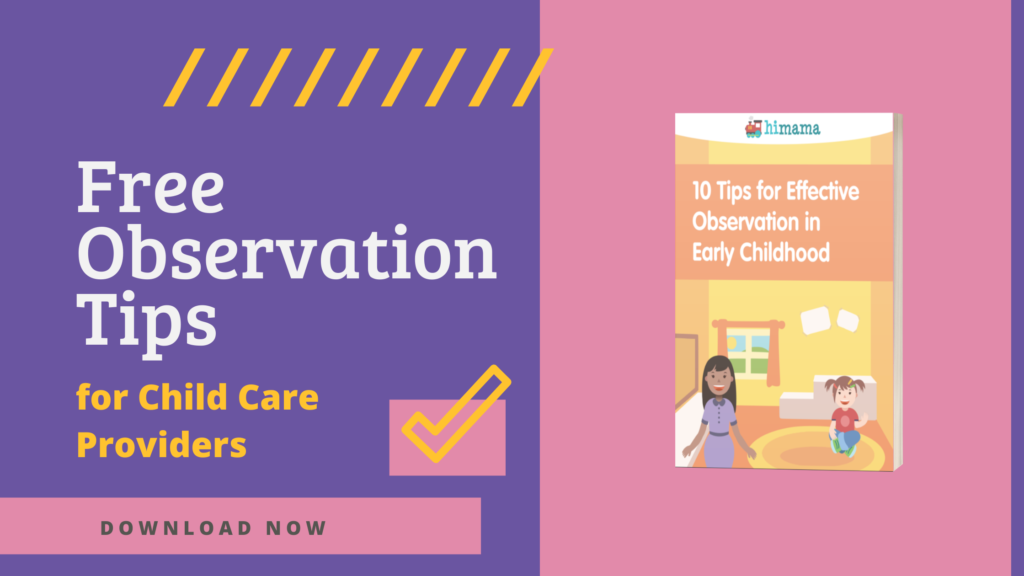Educators and parents should observe children at play because it will help you better understand the strengths and needs of each individual child.
We unconsciously and consciously observe our surroundings on a daily basis; the people around us, our own actions and the environment we are surrounded by.
As an early childhood educator, I am continuously observing children’s play in and out of the classroom. Observations help me understand each child’s knowledge, needs, interests, and skills. They also help me understand how children are learning and highlight where I can shift or add to my curriculum to further their learning and development. To learn more about different early childhood education curricula and programming approaches available today, check out our post about the history of early childhood education.
Why observation is important
As an educator, I need to understand how child observations will drive my own teaching, curriculum, and class routine. In general, early childhood educators observe and document children’s skills and development to understand, support, and enhance their growth.
Observation allows me to understand what a child is interested in and how they are currently learning. What activities interest them? How do they respond to transitions and the room routine? How do they respond to certain activities and/or environments? How is their temperament?
I then use this understanding to see where I can provide better support in terms of the child’s learning and development. Many educators use the continuum of development to document and observe children’s interactions, activities and emerging skills in order to set goals and plan a curriculum in the classroom. As skills are maturing, early childhood educators, including myself, observe to individualize and support skill development.
Here is an example I have observed in a toddler classroom: ‘Jimmy held an empty container in his left hand. He picked up the pom-poms one by one and placed them inside the empty container. Jimmy put the container upside down and watched the pom poms come out’. Based on this observation, I was able to document the child’s specific skill, which is part of cognitive development. We know that the skill observed is toddler spatial exploration – exploring containment by putting objects in containers and by dumping them.
Therefore, I supported the practice and extension of the cognitive skill (spatial exploration) by providing a variety of opportunities for the child (Jimmy) to continue exploring the containment of objects. For example, by using sand and buckets; Pom poms and bottles; and feathers and boxes.

Benefits of play
Play builds imagination and creativity: engaging in pretend play provides opportunities for children to express themselves verbally and non-verbally in creative and imaginative ways.
Play promotes social skills: through play children are starting to learn to communicate, negotiate and collaborate with others.
Play promotes physical development: from running and jumping to grasping a small paintbrush, play is inherently physical and challenges children to move in new ways.
Play helps children understand and express their emotions: children are able to express themselves freely through play by using language, their body movements, and facial expressions.
Play builds relationships: when children interact and communicate with adults, caregivers and other children during play, it helps build strong and safe relationships.

Questions to ask yourself about observing play
It is important for educators to understand and observe what children are interested in and what their individual needs are. Creating a curriculum around the child’s interests and abilities will be beneficial to their own development and learning. We know that children will likely participate and learn in experiences that cater to their interests.
To help with writing your observations, you should ask yourself: Where do they play? Who do they play with? What do they play with? What activities do they participate in? What experiences do they enjoy or don’t enjoy? How do they learn best?
The information that we gather from observing children will help us better engage the curriculum necessities that children need to develop and mature their individual skills, needs, and interests.
Don’t miss another important moment — download our observations guide for some helpful tips to use in your classroom!

Related Posts
- The Importance of Observation in Early Childhood Education
- Child Care Observation: How Much Documentation is Too Much?
- Types of Child Care Observation
- Child observations critical in the early childhood setting
- How Do Child Care Apps Help With Observation? Three Ways an App Will Enhance Observation
- How to Make Health and Wellness Observations in Early Education
- Best Ways to Track a Child’s Development Using an App



The main highlighting points are that observation helps in knowing the temperament of the child,where the child is interested in,etcetra.
They are many benefits of playing outdoors
Helps in developing social skills, helps in exploring themselves,etc
By observing we can the interest of children
I believe in observation as a teaching tool as it shows you what level of skills the child has and what needs to be worked on. Outdoor play allows the child to experience nature and explore natural elements